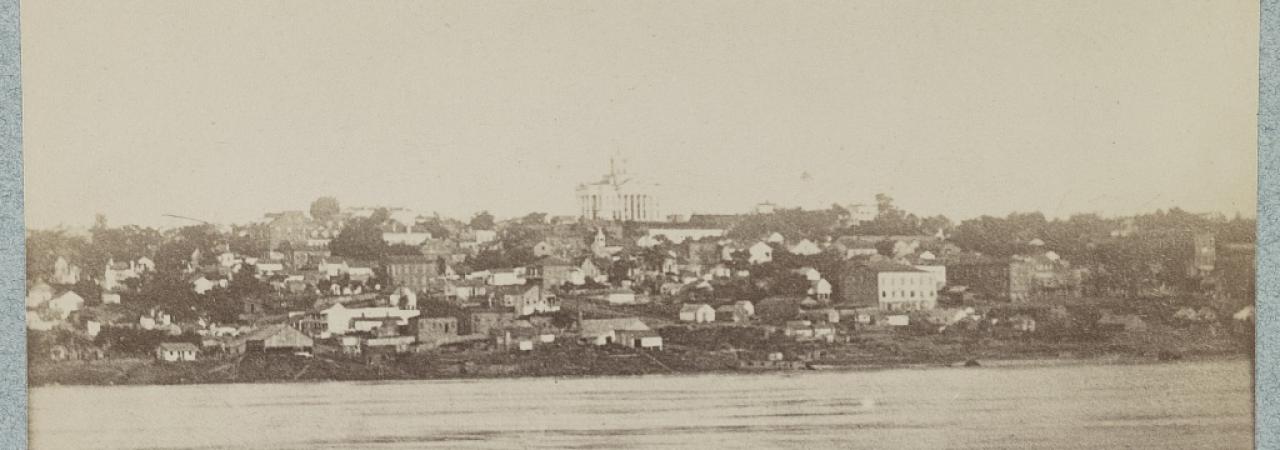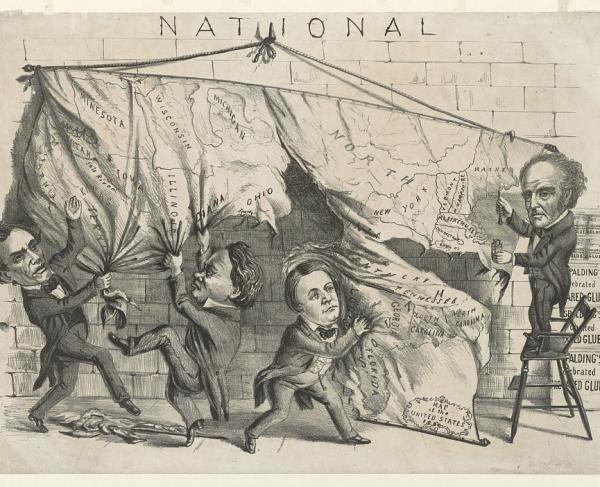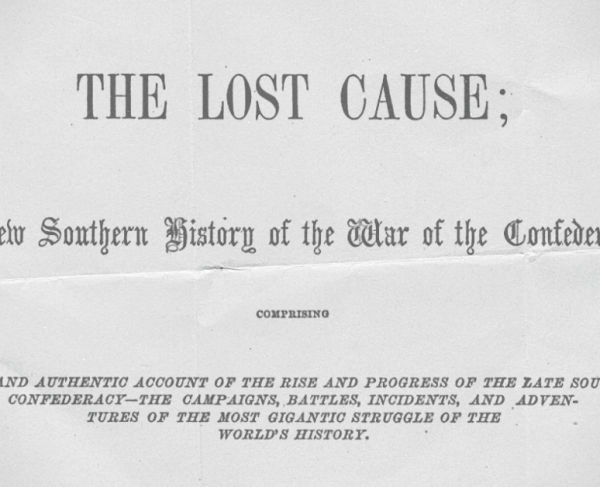Vicksburg, MS: Founding through Antebellum Era
Vicksburg, Mississippi is known for its significance in the Civil War. However, it was a flourishing port city on the Mississippi River long before President Abraham Lincoln recognized it as the “key.” Its cotton trade and river access drew settlers from both the North and South looking to strike it rich during the antebellum period leading to divided allegiances at the onset of the Civil War.
The Spanish were the first to settle around what is modern day Vicksburg in 1791. There, they built Fort Nogales. The area was a desirable location due to its proximity to the Mississippi River and its position high above the river on the bluffs; it functioned as a trading outpost and allowed the Spanish to control the river. However, in 1795, the United States received jurisdiction of the area through a treaty with Spain. The Spanish refused to vacate the fort for years, finally evacuating it in 1798. The United States renamed the fortification to Fort McHenry after the Secretary of War, James McHenry, who served under both President Washington and President Adams. The Fort was well outfitted, having twelve cannons pointed at the river, a powder magazine, a commander’s house, and barracks for 200 men. While the fort was abandoned in the early 1800s due to deterioration, its occupation had drawn settlers to the area, and towns began to form in Warren County.
Newet (or Newit) Vick journeyed from Virginia. He was a Methodist preacher, seeking to establish a church in the region. Vick moved with his wife, Elizabeth, and children to the “Open Woods” area in 1814 and built a cotton plantation. He also obtained land on the bluffs in 1816; his intention was to divide it up into tracts. Unfortunately, both Newet and Elizabeth died on August 5, 1819, from yellow fever. John Lane, the husband of Vick’s oldest daughter, Sarah, began acting as the executor of his estate, which included enslaved people. Following Vick’s directive in his will to form a town on the bluff land, he sold plots to speculators. Lane failed to share the earnings with Vick’s other heirs, thus leading to a 25-year court battle. The Mississippi Supreme Court, in Lane v. Vick, granted the land back to the Vick children to be sold with profits shared equally. Nevertheless, the town of Vicksburg, Mississippi, had been formed.
Mississippi had been a state for eight years when Vicksburg became an incorporated town in 1825. At the time, fewer than 500 people called it home. However, like other river communities, with steamboat travel on the Mississippi becoming more popular and regular, more settlers made their way to Vicksburg. They came from the North as well as other places in the South. Vicksburg drew settlers in with its fertile open land, making it a sensible choice to build a farm or plantation, and its nearness to the Mississippi, making it a convenient location to sell goods. By 1835, the town had grown by 300% and became an incorporated city.
Vicksburg’s community resources grew with the population. Though it was not initially the main town in Warren County, it soon became the center of its activities. Churches, hotels, and newspapers were established in the city. Important public services such as a jail, fire department, militia and school were set up. The county courthouse was moved from Warrenton to Vicksburg. Ladies of Vicksburg founded charitable societies. Vicksburg became the commercial, financial, and social hub, and by 1860, it was the second largest city in Mississippi.
Vicksburg’s prosperity came in part due to cotton and the ability to move it. Farmers grew cotton on their plantations and shipped it elsewhere. In 1825, Vicksburg passed 4,000 bales of cotton through its port. Ten years later that had grown to between 30,000 and 45,000 bales. By 1850, it had reached over 250,000 bales. Steamboats helped transport the cotton to other ports, such as New Orleans. Railroad lines through Vicksburg, built in the latter half of the antebellum period, opened trade even further. This level of commerce made Vicksburg a center of riverboat activity and one of the leading port cities on the Mississippi.
Vicksburg’s plantation owners, like many across the South, relied on the labor of enslaved people. This workforce was crucial to the planting and harvesting of crops. In 1850, the enslaved population in Warren County was one-third larger than the white population at over 10,000. That same year, a number of laws were passed known as the Compromise of 1850. Mississippians believed these laws, which addressed slavery and territorial expansion, jeopardized the expansion of the institution to the west. The Legislature called a convention to discuss secession where they voted to remain in the Union and adhere to the stipulations of the Compromise.
Concerns raised in 1850 were resurrected by the election of 1860 and the rumblings of a civil war which threatened Vicksburg on two fronts. A civil war would endanger trade with the North, something the planters depended on. Conversely, they also relied on the labor of enslaved people to produce cotton, so they did not want to see the institution end. Of the four candidates for President in the election of 1860 – Abraham Lincoln (not on the Mississippi ballot), John C. Breckenridge, Stephen A. Douglas, and John Bell – Vicksburg’s citizens felt John Bell aligned best with their needs. Bell’s party, The Constitutional Union Party, and platform held a neutral stance on slavery and asserted the importance of keeping the states unified. However, it was Abraham Lincoln who won the election, sending much of the South into a panic about states’ rights and slavery. One Vicksburg citizen even placed a newspaper advertisement with a bounty for Lincoln’s head.
Most of Vicksburg still hoped the union would be preserved despite Lincoln’s election. A week after, the Vicksburg Daily Whig called upon Vicksburg’s citizens to:
Choose under which banner they will serve—disunion, with all its attendant horrors of rapine, murder and civil war—or Union, with the guarantees of the Constitution to protect us, and one-half of the people of the North to sympathise and aid us in maintaining our rights. Shall we plunge into war from which we can derive no benefit, merely to gratify the ambition of a few desperate leaders, or shall we boldly and bravely face the issue and maintain our rights in the Union? There is no doubt about our position. We are against disunion and the disunionists.
For most Vicksburg citizens, secession was seen as a last resort. When a convention to discuss Mississippi’s secession was called, the Warren County pro-Union representatives received 561 votes to the pro-secession’s 173. At the convention, only one other county voted to remain in the Union. However, Mississippi formally seceded on January 9, 1861.
Vicksburg’s unionists faced a difficult decision following Mississippi’s secession. Some fled to the North. Others remained in Vicksburg and continued to support the Union. This was risky as pro-Confederate “Vigilance Committees” formed to find those favoring the Union and punish them. While many switched their allegiances to the Confederacy. Some historians attribute this to the composition of Vicksburg’s population, reasoning that only a few families had deep roots in Vicksburg, while 74% of the population was born in the South. As such, they felt more connection to the South and therefore the Confederacy than to the Union. This dedication to the Confederacy was demonstrated in civilian actions during the Siege of Vicksburg and through the 2,500 Vicksburg men who served in the Confederate Army.
After 47 days of fighting, on July 4, 1863, the Union Army and Navy succeeded in capturing Vicksburg. This victory, in conjunction with Gettysburg and the fall of Port Hudson, signified a positive turning point in the war for the Union. It gave the Union complete control of the Mississippi River, therefore cutting off a major supply line for the Confederacy. It also meant freedom for Vicksburg’s enslaved population. Union troops occupied the city through the end of the war. Vicksburg, like most other places in the South, had to rebuild and adapt following the war. Challenges were encountered particularly in respect to the implementation of Reconstruction Era policies. Nevertheless, the city of Vicksburg has made significant efforts to preserve and recognize its history through its historic sites, Museums and the Vicksburg National Military Park.
Suggested Reading:
Becoming southern: the evolution of a way of life, Warren County and Vicksburg, Mississippi, 1770-1860 by Christopher Morris (Oxford University Press, 1995)



